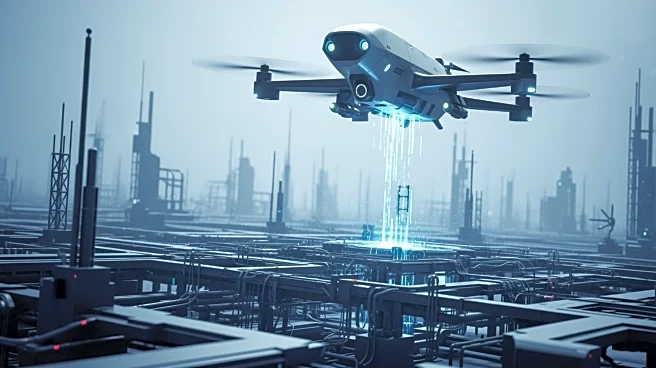What's Happening?
Ukraine has intensified its long-range drone campaign against Russia, targeting strategic sites such as oil refineries and military logistics hubs. These drones, assembled in secret locations in Ukraine,
have significantly increased their range, now capable of striking targets deep within Russian territory. The campaign has led to gasoline shortages and rationing in some Russian regions, highlighting vulnerabilities in Russia's infrastructure. Ukrainian officials report over 160 successful strikes on Russian oil facilities this year, causing disruptions in refining capacity and forcing Russia to import fuel.
Why It's Important?
Ukraine's drone strikes represent a strategic shift in the conflict, allowing Kyiv to exert pressure on Russian infrastructure and logistics. By targeting energy facilities, Ukraine aims to weaken Russia's ability to sustain military operations. The strikes have forced Russia to reroute supplies and bolster air defenses, stretching its resources. This development underscores the growing importance of drone technology in modern warfare, offering Ukraine a cost-effective means to challenge a larger adversary. The campaign also aligns with Western sanctions on Russia's oil industry, amplifying economic pressure on Moscow.
What's Next?
Ukraine is likely to continue its drone operations, further refining its technology and tactics to maximize impact. The ongoing strikes may prompt Russia to enhance its air defense systems and adjust its military strategies. Internationally, the situation could influence discussions on drone warfare and its implications for global security. As Ukraine seeks additional support from Western allies, the effectiveness of its drone campaign may bolster its case for receiving advanced weaponry. The conflict's dynamics will continue to evolve, with both sides adapting to the changing landscape.
Beyond the Headlines
The use of drones in Ukraine's strategy highlights ethical and legal considerations in warfare. The ability to conduct remote strikes raises questions about accountability and civilian safety. Additionally, the reliance on homegrown technology reflects Ukraine's innovative approach to overcoming resource limitations. This development may inspire other nations facing similar challenges to explore unconventional military solutions. The conflict also illustrates the broader geopolitical implications of drone warfare, potentially reshaping defense policies and international norms.









